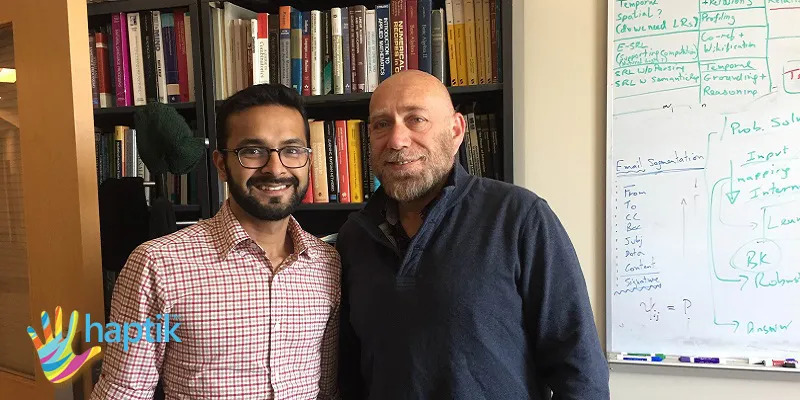Haptik onboards NLP expert Dan Roth to improve the technology layer under its 150+ chat experts
Haptik is a chat application founded by Aakrit Vaish and Swapan Rajdev in 2013. The app provides a personal assistant service over messaging, where users can chat with experts to get anything done. The company has raised $1.2 million from Kalaari Capital and others (see complete story) and has since grown to a team of about 170. Of this, there are about 150 chat experts that help users with their queries. At the heart of the company, is a technology layer which is continuously learning and automating responses. To make this layer stronger, the company has onboarded Professor Dan Roth, a machine learning scholar from the University of Illinois in return for a piece of Haptik's equity.

Coming from Aakrit and Swapan's alma mater, Professor Dan Roth has about 20 years’ experience globally in Natural Language Processing and is one of the biggest names in the field of Artificial Intelligence. Over the years, his work has been funded by grants from Google, Microsoft, Intel, Boeing, Motorola as well as government agencies including the National Institute of Health and the Department of Defense. “The secret sauce of Haptik is machine augmented intelligence,” says Swapan Rajdev, Co-Founder & CTO of Haptik, who will be closely working with Prof. Roth. “Our goal has always been to ensure that the right response is given in the fastest possible time. Whereas all of it is human powered, the accuracy of answers is ensured using data science and natural language processing (NLP) techniques," he adds.
Work on this started roughly six months back and the team has been encouraged by the initial results. The company currently has close to 150 chat operators who respond to user queries using the Haptik data backend, which is powered by NLP but 50% of the queries are already being answered by the machine. Aakrit says, “At the heart of it, Haptik is a hardcore technology company. Our goal is not to train people better, but to make technology so good that training becomes redundant. That is the only way to get to 100 million users.”
Haptik doesn't reveal the number of downloads or the active users but only tells us that about 2 million messages are being exchanged every month. The Google Play Store indicates more than 100k downloads. “The problem Haptik is trying to solve is one that is very close to my heart”, says Prof Roth, who is also the Editor in Chief of the Journal of Artificial Intelligence Research (JAIR). “Most of my career has been spent in this area, and I’m happy to see the transition to the smartphone with Haptik. I started talking to Swapan and Aakrit a few months ago, and realized quickly they are on to something. My goal is going to be to use whatever tools available to ensure the success of the service, and I am super excited to help the team in the process.”
The artificial intelligence space in the field of messaging is becoming intense. Haptik's closest competitor is Akosha which just raised a giant INR 100 crores series B round. Apart from these in the customer service segment, there are players like the Light App which are weighing in with NLP and Machine Learning. For Haptik, the aim is not to completely eliminate the human touch. Aakrit concludes by saying, "If there were no real people, then users might as well Google things. Our model is 'machine augmented human intelligence', which means the machine will help provide the right solutions but ultimately will come down to chat experts making the decisions."







